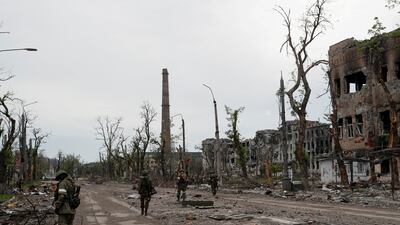There are growing fears of a cholera outbreak in the Ukrainian port of Mariupol, where officials say the Russian onslaught has left behind a nightmarish landscape of rotting corpses, rubbish and polluted water.
The pro-Ukrainian city council said tens of thousands of deaths from cholera were a “potential real scenario” for Mariupol, where Russia declared victory last month after a weeks-long siege characterised by some of the heaviest fighting of the war, leading to most of the city's population being evacuated.
That exodus has added to the city’s problems because there is now a shortage of doctors and many residents who were unable to leave Mariupol are already old and sick, city officials said.
“In this state of medicine, any infectious disease turns into a deadly epidemic,” said Petro Andryushchenko, an adviser to Mariupol’s mayor. Some city officials have relocated to temporary homes in towns such as Dnipro or Zaporizhzhia.
Dr Margaret Harris, a representative of the World Health Organisation in Ukraine, said damage to infrastructure during the fighting meant water had become mixed with sewage.
The WHO is concerned about the risk of cholera in the ruins and has positioned cholera treatment and vaccination supplies in the area, Dr Harris said.
Cholera is caused by eating or drinking contaminated goods. It can kill within hours if nothing is done, although many people develop no symptoms and treatment is effective if done promptly.
A regular British intelligence update said isolated cases of cholera had been reported since May and said there was a risk of a major outbreak in Mariupol.
This reflected a pattern of Russia being unable to provide basic services in occupied territories, the UK's Defence Ministry said, with access to drinking water patchy and telephone and internet services disrupted.
“Medical services in Mariupol are likely already near collapse: a major cholera outbreak in Mariupol will exacerbate this further,” it said.
Ukraine suffered a significant cholera outbreak in the mid-1990s, which killed about 30 people, and there have been more cases since along the Sea of Azov where Mariupol is located.
The city council said Mariupol was “literally drowning in garbage and sewage”, that water was polluted and that hasty burials, or people being buried under rubble, meant thousands of bodies were decomposing in the summer heat.
About 22,000 people were killed in the fighting, the council said. An estimated 200,000 left for Ukrainian-held territory, while another 100,000 or so are said to be living under Russian occupation outside Mariupol.
Ukrainian President Volodymyr Zelenskyy said in May that Mariupol had been “completely destroyed” in the fighting. Russia described it as a liberation after it captured the final Ukrainian stronghold in the city, the Azovstal steelworks.
Western officials considered Mariupol to be strategically important because it links Russian-annexed Crimea with the territories Moscow is trying to seize in eastern Ukraine.
Mr Zelenskyy said in an overnight address that key Donbas cities such as Severodonetsk and Lysychansk were “holding on” against Russia’s attempts to seize the region.



















































